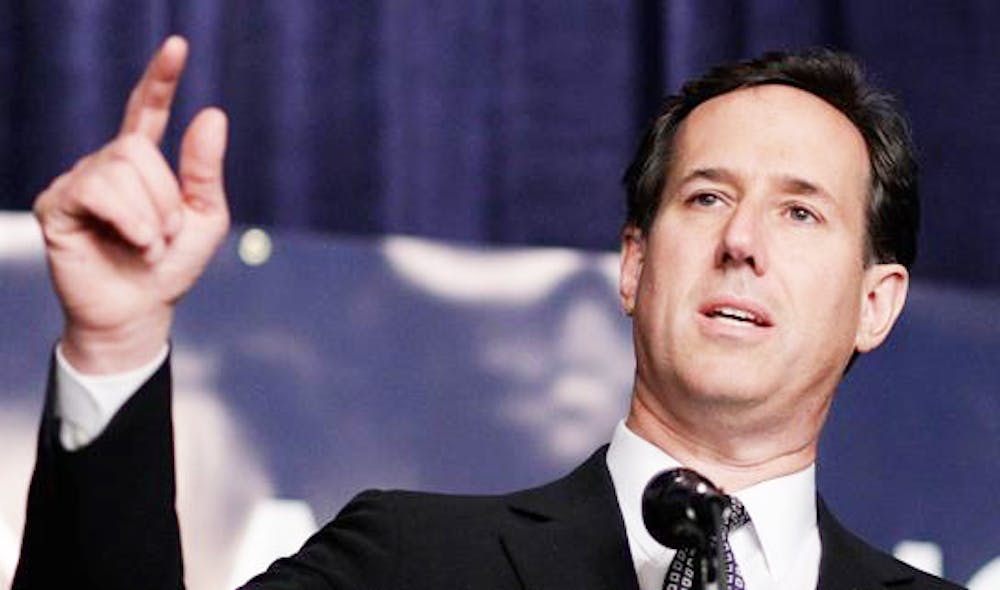By Tom Ballard
Opinions Editor

Iowa: When one enters the name of the 29th U.S. state into a search engine, the results will most likely be made up of the state government’s official website, maps showing the Midwestern state’s geographical location, some pretty pictures of the state’s cities and universities, something corn-related and, most predominantly, news articles about the recent polls and speeches coming out right before the Iowa caucuses. Despite the massive press attention that the caucuses garner, one thing about the event should be clear: It’s an irrelevant political side-show that bears little importance on the outcome of the presidential election.
The Hawkeye State has the esteemed position of being the first state in the country to hold elections for both the Democratic and Republican parties’ nominations for president of the United States. A caucus, unlike traditional primaries like the ones that take place here in New Jersey, do not occur throughout the entire day, but usually at an established meeting time in the evening at public places such as churches and school gymnasiums. Although the procedures and layout of the caucuses vary between the two parties, caucuses like Iowa’s are less formal voting events that allows the supporters of a certain candidate to convince undecided party voters to support their candidate. Besides for making C-Span incredibly more watchable, the caucuses lack any real relevance, in retrospect, to whom each respective party will nominate.
According to Republican National Committee’s (RNC) website, the GOP allocates 30 delegates to represent Iowa, and its choices for the presidential nomination, at the party’s national convention being held in Cleveland, Ohio, in July. That’s a mere 1.2 percent of the 2,472 delegates that will be attending the convention. The number of delegates awarded in the Monday, Feb. 1, Caucus pales in comparison to the one on Tuesday, March 1, referred to as “Super Tuesday.” On that day, according to the RNC’s website, 12 states hold their primaries or caucuses, distributing a total of 632 delegates. That’s roughly 25.5 percent of the delegates voting in the convention that are distributed in a single day.
In the past two election cycles, Iowa has proven to be unreliable in predicting who would move on to accept the GOP’s nomination. The evangelical-supported candidates, Rick Santorum, former senator from Pennsylvania, and Mike Huckabee, former governor of Arkansas, won the state in 2012 and 2008, respectively, while the more moderate candidates, Mitt Romney, former governor of Massachusetts, and John McCain, senator from Arizona, won the GOP nomination in 2012 and 2008, respectively.
Iowa has, however, been more successful in picking the Democratic presidential candidate. According to the Des Moines Register, then-Illinois Senator Barack Obama won the state in 2008 and current Secretary of State John Kerry won in 2004. Both moved on to win the Democratic nomination in the respective years. Despite history, the year is now 2016 and the 52 Iowa Democrats are an even more insufficient delegation compared to their GOP counterparts. The 52 Democrats make up only 1.1 percent of the 4,768 total delegates voting in the Democratic National Convention in Philadelphia in July, according to the Democratic National Committee. Also, a more competitive national race between former Secretary of State Hillary Clinton and Vermont Senator Bernie Sanders means that earlier voting states, like Iowa and New Hampshire, may have less sway on influencing who becomes the next Democratic presidential nominee.
This competition comes from recent polling, according to Real Clear Politics, a Chicago-based polling data aggregator that collects data from several prominent polling institutions in the country, shows the margins between Clinton and Sanders closing in, even at the national level. If these margins continue to tighten-up, later voting states, which usually draw little attention due to the fact that the party’s apparent nominee has typically secured a majority of the total delegates before the states casts their ballots, may be in the position to decide who becomes the Democratic nominee.
On Monday, Feb. 1, the country will witness the first elections for the 2016 presidential nominations of both parties. Even with the media hype surrounding the event, I can’t help but remember what former U.S. Ambassador Jon Huntsman told CBS News in 2012: “They pick corn in Iowa… and (they) pick presidents… in New Hampshire.” In terms of the past couple of Republican presidential primaries, it’s a pretty accurate statement.
Students share opinions around campus
Do you plan on voting in the primaries?

“Yes... I haven’t really been keeping up with the debates... I don’t think (some of the candidates are) taking it as serious as they should.”

“I do... I think most of (the candidates) are not too good but there are some that are all right.”







